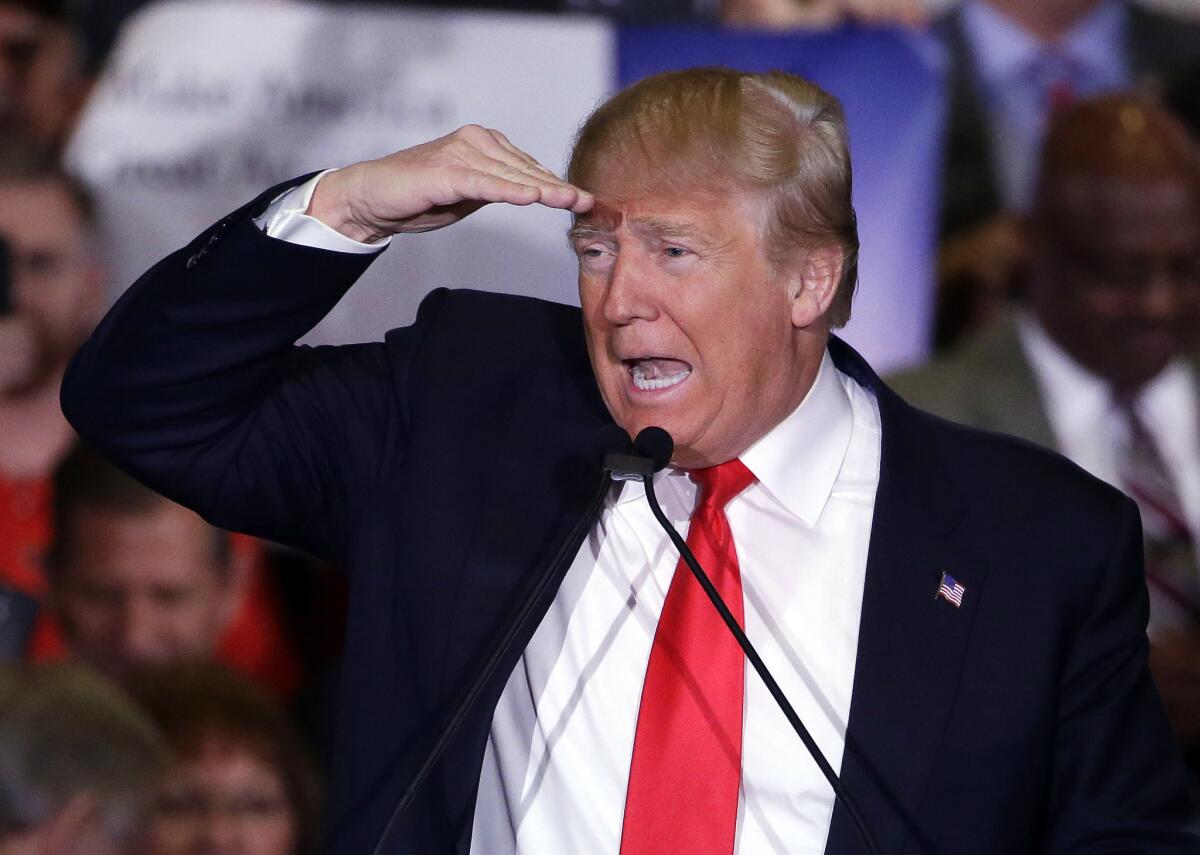Column:: Donald Trump knows exactly what he’s doing

Republican presidential candidate Donald Trump looks out onto the crowd during a rally on Feb. 23 in Reno, Nev.
The Republican establishment has finally woken to the danger it’s in: Unless something changes soon, Donald Trump is going to be the party’s nominee for president. How is this possible?
As has often been noted, Trump has been able to win primaries with no more than 35% of the vote because the GOP field is so fragmented. The non-Trump majority has divided its votes among Sen. Marco Rubio, Sen. Ted Cruz, Gov. John Kasich and others.
But there’s another, less obvious reason Trump is doing so well: He’s turned out to be a disciplined candidate with a clear strategy. He’s not the unguided missile he once appeared to be.
His attacks on other candidates may have looked petulant, but it’s now clear that they were calculated. For much of last year, Trump concentrated his fire on Jeb Bush, who was long considered a front-runner.
Trump grabs media attention by saying something outrageous - and then takes a step back, as if to say: I didn’t mean it literally.
When Bush faded, Trump moved his sights to Cruz, who was trying a little too obviously to steal Trump voters. There was nothing random about the choice of targets. “Ted is hanging around the top too long,” Trump told aides in January, according to the Wall Street Journal. “Time to take him down.”
If the pattern holds, Trump’s next punching bag will be Rubio, who’s been unofficially anointed as the Great Establishment Hope. You can expect Trump to warn voters that Rubio is in the pocket of the big-money donors who are frantically pumping cash into his campaign.
Besides, as Trump said last year (at a time when Rubio was surging): “Marco Rubio, he’s like a kid.... He sweats more than any young person I’ve ever seen.”
Trump’s campaign has been a strategic success in another, subtler way: He’s quietly climbed down from positions that might alienate too many GOP voters.
The real estate mogul has kept the core of his populist message clear: He says he’ll get rid of “incompetent” politicians, halt illegal immigration by building a wall on the U.S.-Mexico border and stop “losing” to other countries.
But he’s also softened some of his most unusual statements, if only around the edges.
After tangling with Pope Francis over immigration last week, he quickly decided to call a truce. “The Pope is great,” he told voters in South Carolina.
After charging that President George W. Bush lied to take the country to war with Iraq in 2003, Trump muddied his attack. “He could have lied. Maybe he did, maybe he didn’t. You’d have to ask him,” he said.
After surprising conservative voters by defending Planned Parenthood, he promised that he would block federal funding for the group if it continued to offer abortions.
And Trump has even shown unexpected charity toward the news media. “We love the press,” he said at a rally last week. “We’re hard on the press; I’ve called them so many different names.”
Notice the pattern? Trump grabs media attention by saying something outrageous — and then takes a step back, as if to say: I didn’t mean it literally. That “free media” strategy has enabled Trump to dominate the debate.
Trump is also more traditional than he may seem when it comes to financing his campaign and motivating supporters.
He has often boasted that his campaign is “self-financed,” but like many other Trump claims, that’s not entirely true. About one-third of the $26million he’s collected has come from individual donors.
And although he’s joked that money spent on television commercials is probably a waste, his campaign still aired almost as many ads as Cruz’s (if far fewer than Rubio or Bush) in South Carolina.
Finally, while the hallmark of Trump’s campaign has been giant rallies, he’s used the names collected at those events for old-fashioned telephone drives to get out the vote on election days. “What’s more productive?” his South Carolina campaign manager asked. “Having 10,000 people in one night [at a rally], or having 100 people go bang on 5000 doors and half of them being empty?”
In short, Trump’s campaign isn’t all that chaotic. It’s a well-designed amalgam of old and new that makes good use of the candidate’s reality-TV strengths.
The results are striking: In recent polls, Trump is running ahead of Rubio in Florida, ahead of Kasich in Ohio and close to Cruz in Texas.
He’s still divisive, uncivil and mendacious. He’s still the most unconventional candidate we’ve seen in a long time but part of his crazy genius is that he’s not as unconventional as he pretends.
Twitter: @doylemcmanus
Hoy: Léa esta historia en español
Follow the Opinion section on Twitter @latimesopinion and Facebook
More to Read
Sign up for Essential California
The most important California stories and recommendations in your inbox every morning.
You may occasionally receive promotional content from the Los Angeles Times.











